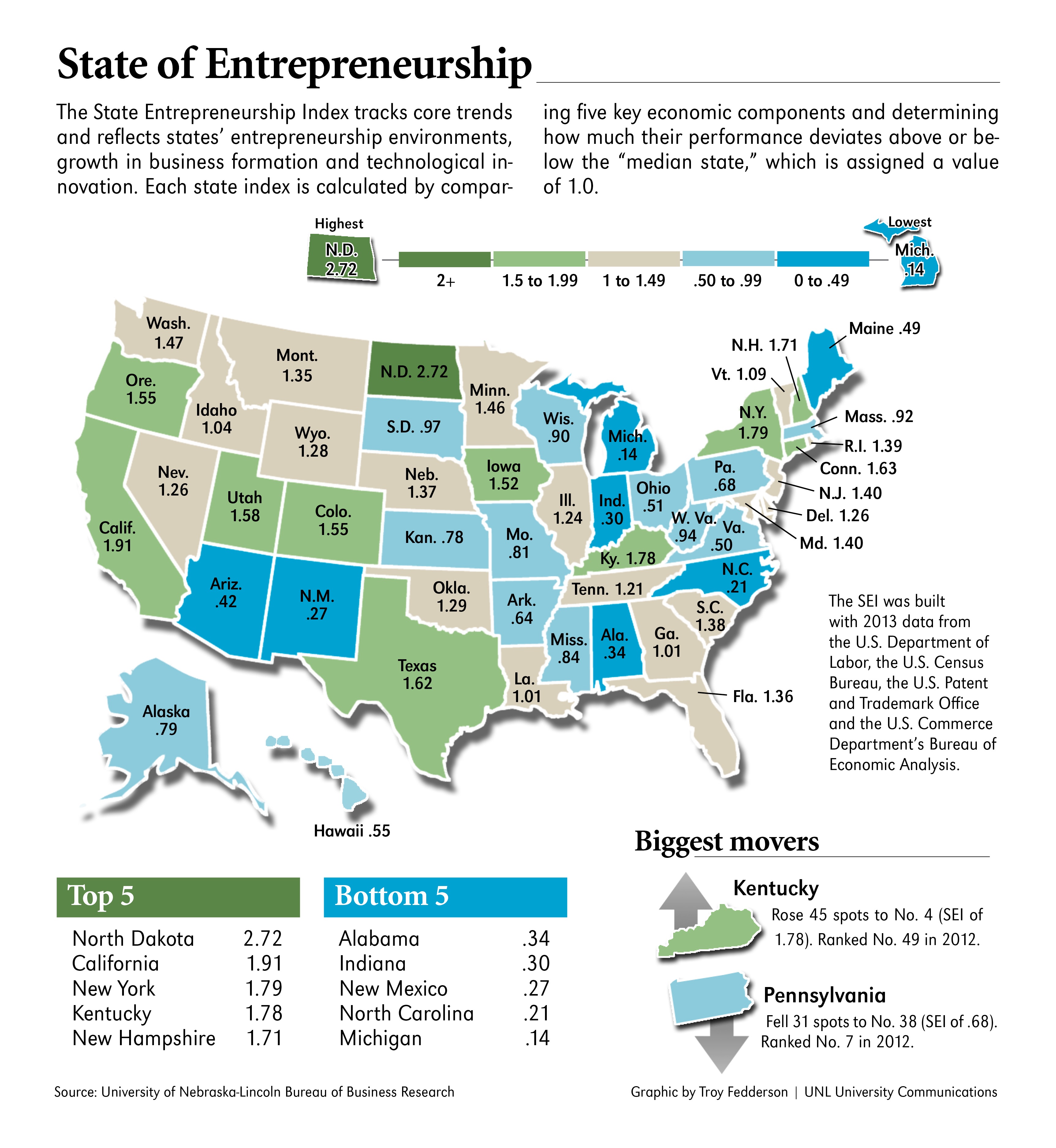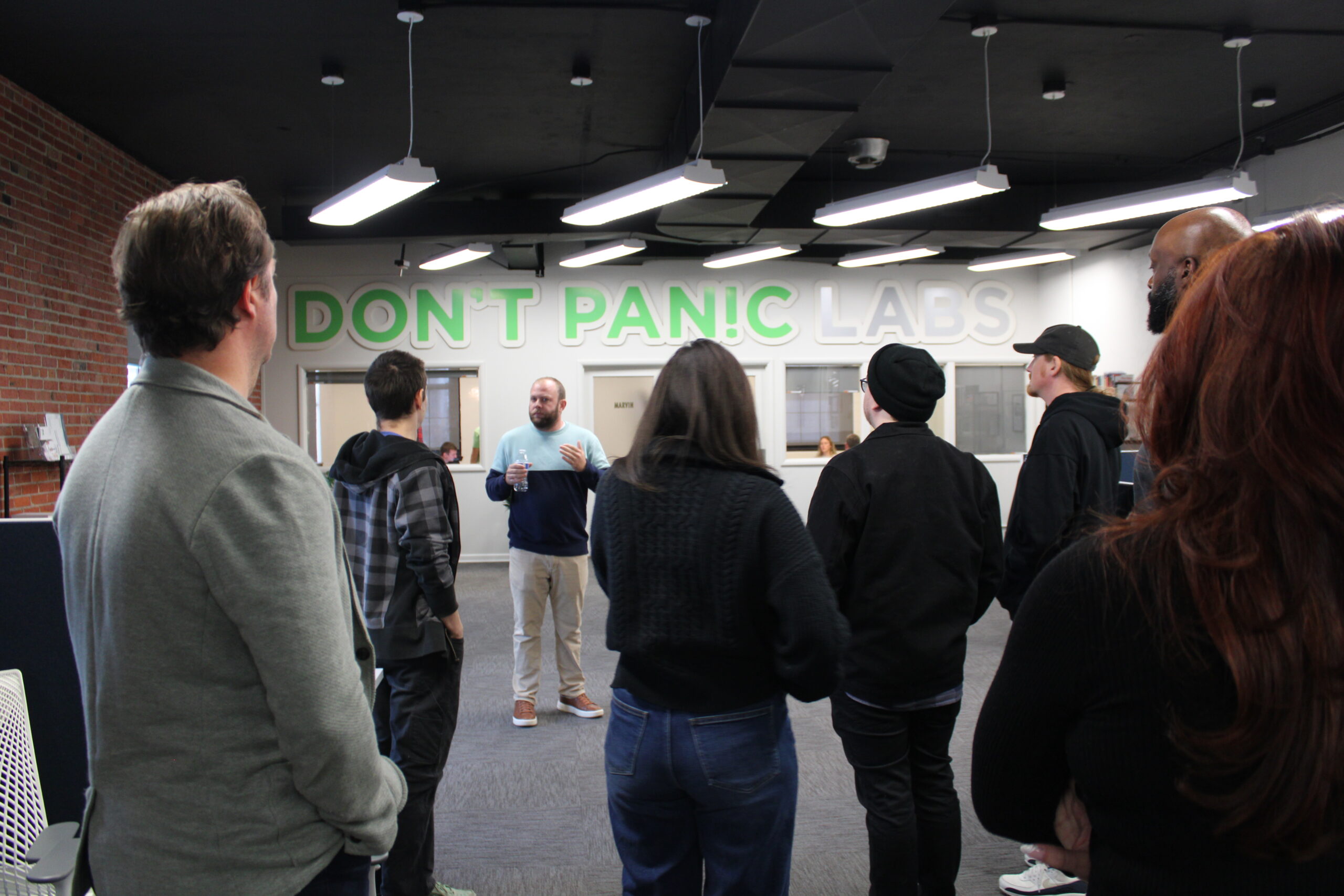 Economists at the University of Nebraska-Lincoln published the results of their annual State Entrepreneurship Index last week. Though co-author Eric Thompson admitted the index reinforces a long-standing bias toward the east and west coasts, he said Prairie states like Iowa and Nebraska ranked well.
Economists at the University of Nebraska-Lincoln published the results of their annual State Entrepreneurship Index last week. Though co-author Eric Thompson admitted the index reinforces a long-standing bias toward the east and west coasts, he said Prairie states like Iowa and Nebraska ranked well.
“I have to confess that it does reinforce this stereotype, this predilection that some people have toward opportunity on the coasts,” he said. “But the index is also saying there’s plenty of opportunity and things going on here, too.”
Iowa came in at 11th while Nebraska ranks 18th and Missouri 35th.
Though both Iowa and Nebraska fell several spots from their ranks in 2012, they’ve also risen significantly since 2011, when Iowa landed at 43 and Nebraska 24. Missouri rose five spots since last year.
Nebraska, specifically, struggles with patents per capita, but has benefited from weathering the Great Recession with relative ease, Thompson says, adapting quickly and avoiding a mammoth housing bubble.
He attributed Nebraska’s adaptability to a number of factors, including a very educated workforce and a strong agricultural economy during the recession years. Nebraska consistently scores well in proprietor income, especially in the Omaha area, too.
“Part of the reason it’s done well in recent years,” he added, “is the business births have really improved, and we’ve also done better in net establishment growth.”
The SEI, first published in 2008 as part of Thompson’s book, “Entrepreneurship in Nebraska,” combines five factors to formulate the overall state rankings: establishment growth, establishment growth per capita, business formation rates, patents per 1,000 people and income levels for non-farm proprietors. In comparing these factors state-by-state and calculating their deviation from the median, the SEI ultimately reflects states’ entrepreneurial environment.
Because the SEI takes into account multiple factors, it often produces results that differ from those indexes ranking only new business formation.
For example: New York.
“New York’s economy struggles in a lot of ways, but I think we also know intuitively that New York is an incredibly entrepreneurial place,” he says. “And so our index is able to reflect that, because of the very high income of the proprietor, and because of the patent activity, and so I think we give a richer picture of entrepreneurship than just counting business births on a per capita basis.”
North Dakota, spurred forth by the ongoing oil boom and related entrepreneurial growth, easily nabbed the number one spot in this year’s index, followed by California, New York, Kentucky and New Hampshire. Michigan ranked last, struggling with establishment growth and proprietor income. Unlike previous years, Thompson was surprised this year to find a greater geographical distribution in both the top and bottom-ranked entrepreneurial states.
“You could pick a state or two from every region,” he said. “I think that’s good news. We’d like it to be idiosyncratic, and not always the same regions struggling. I think that’s the best for the nation.”
The South and industrial Midwest are still lagging behind, he said, “but they were really behind before, and they seem to finally be breaking out a little.” He points to Kentucky, the “poster boy” for the South, which climbed 45 spots last year to rank fourth overall.
“That was a state that had trouble adapting to the Great Recession. Because of the relative importance of manufacturing there, and because of how hard manufacturing got hit, I think they had a lot of trouble coping with the change,” he said. “To make up for the years which had gone quite poorly, they had one very good year. We’ll see if it morphs into a second or third really good year.”
In general, entrepreneurship tends to stick, Thompson says. He points to states like Massachusetts, whose economy “has reinvented itself a thousand times.”
Entrepreneurship may be slow to spread, but once it establishes itself, it tends to snowball, he said, another positive sign for states like Nebraska and Iowa that seem to be progressing.
“I think entrepreneurship, to an extent, is something that’s learned within families. It’s also, obviously, influenced by experience, by the pool of venture capitalists. So I think there’s an element of inertia to it. The states that are strong in entrepreneurship were strong 40 years ago, too.”
But tax breaks and other economic incentives matter, too, he said. He pointed to states like Illinois, “which did pretty well this time, but doesn’t always do as well as a state that contains Chicago might.” Though first-time entrepreneurs may not place much emphasis on location, serial entrepreneurs do, he said, and a poor business climate will drive many of them away.
“As people get more successful, they do start to think about what state it makes sense for them to be based in,” Thompson said. “Over time, states with a poor business climate can lose some of that entrepreneurial edge they had.”




7 responses to “Entrepreneurship Index still shows bias to coasts, but Prairie catching up”
[…] Entrepreneurship Index exhibits Prairie catching up PastedGraphic-2 Economists on the College of Nebraska-Lincoln revealed the outcomes of their annual State Entrepreneurship Index final week. Although co-writer Eric Thompson admitted the index reinforces an extended-standing bias towards the east and west … Learn extra on Silicon Prairie News […]
Interesting factors to weigh. The top state is a bit surprising, probably due to per capita influence, so it’d be intriguing to see some more depth into the index’s calculations.
[…] Entrepreneurship Index exhibits Prairie catching up PastedGraphic-2 Economists on the College of Nebraska-Lincoln revealed the outcomes of their annual State Entrepreneurship Index final week. Although co-writer Eric Thompson admitted the index reinforces an extended-standing bias towards the east and west … Learn extra on Silicon Prairie News […]
[…] as a hot market cools – WSJ Where have all the entrepreneurs gone? – Washington Post Entrepreneurship Index shows Prairie catching up – Silicon Prairie News Startups take a shine to urban agriculture – Xconomy The humble […]
What is “establishment growth” measuring in this study? Also, presumably this index is tracking small business starts (retail shops, lifestyle businesses, etc) alongside scalable startups, correct?
[…] Entrepreneurship Index shows Prairie catching up Silicon Prairie News […]
We’ve improved, but we have serious work to do KS & MO! Time to step up our game!